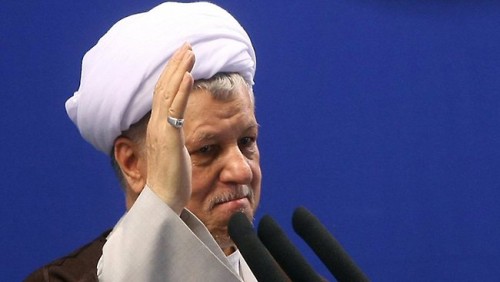PHOTO: Iran’s former President Hashemi Rafsanjani, a key ally of President Rouhani
LATEST
Former President Hashemi Rafsanjani has stepped up Iran’s internal fight over forthcoming elections for Parliament and the Assembly of Experts, challenging an MP who claimed that Rafsanjani would try to manipulate the vote.
Rafsanjani, the mentor of President Rouhani and head of the Expediency Council, published a lengthy statement after Ali Reza Zakani said in an interview that the former President “prefers a controlled and limited election”.
Rafsanjani said the “spiteful and humorous” remark came from a man who “received only a limited number of votes in the last Parliamentary election” and has “confronted the decisive vote of lawmakers and the approval of the Supreme Leader” of the July 14 nuclear deal with the 5+1 Powers. He concluded that Zakani does not have the right to “spread insults to the elders of the political system”.
President from 1989 to 1997, Rafsanjani has been in a long-term battle with Iranian hardliners, especially after he defended the right to protest following the disputed 2009 Presidential election. He lost his chairmanship of the Assembly of Experts in 2011 and was barred by the Guardian Council from standing for President in 2013 — a move that backfired when Rouhani won a surprise victory.
In recent weeks, Rafsanjani has been among those implicitly accused of “sedition” as hardliners try to block a win by an alliance between Rouhani-Rafsanjani “moderates” and reformists in February’s vote. The hardline campaign has included the arrests of journalists and businessmen by the Revolutionary Guards.
See Iran Daily, Nov 5: Rouhani Fights Back, Criticizing Arrests of Journalists and Businessmen
Iran Feature: Head of Revolutionary Guards Warns of “4th Sedition” & Attacks Government
Mohammad Javad Larijani, a senior official in the judiciary, maintained the “sedition” theme on Thursday, claiming the US has invested in “the development of Internet networks and access to Iranian users” to undermine the regime.
Larijani — the brother of Speaker of Parliament Ali Larijani and head of judiciary Sadegh Larijani — said, “Western human rights are an intellectual banner that influences the people’s minds in order to dominate them.” He maintained that sanctions on Iran over human rights violations were needed by the West to try and suppress the Islamic Republic.
Last week, the UN Special Rapporteur for Iran, Ahmed Shaheed, issued another report citing Iran’s rising rate of executions; imprisonment of journalists, students, lawyers, members of religious minorities, and rights activists; and restrictions of communications.
Top Official Salehi Maintains Government Commitment to Implementation of Nuclear Deal
The head of the Atomic Energy Organization of Iran has rebuffed pressure by hardliners to suspend implementation of the July 14 nuclear deal.
Ali Akbar Salehi said at a conference in Japan that the Rouhani Government was still aspiring to confirm implementation by the end of December. Verification by the International Atomic Energy Agency is needed for the lifting of US and European sanctions.
Salehi emphasized that the AEOI “will do everything the President has said” in fulfilling the obligations under the Joint Comprehensive Plan of action.
Earlier this week, more than 200 of Iran’s 290 MPs sent a letter to President Rouhani calling on the Government to hold up implementation until the US and European Union publicly declared the removal of sanctions. Some MPs subsequently criticized Salehi’s announcement of the start of the process taking uranium enrichment centrifuges off-line.
See Iran Daily, Nov 4: Government Steps Back on Implementation of Nuclear Deal

